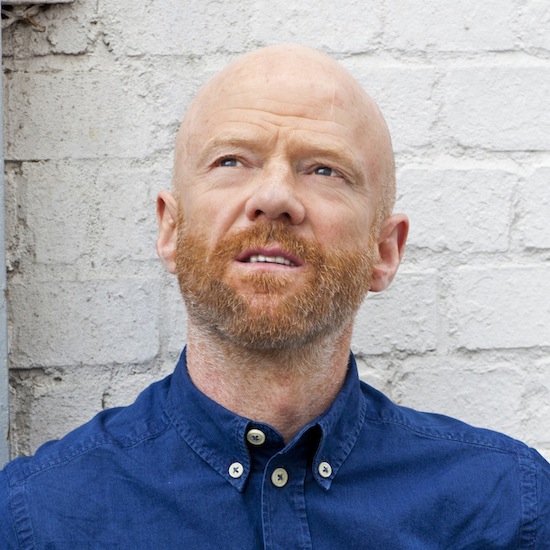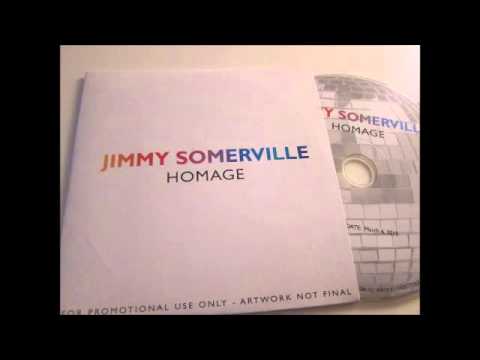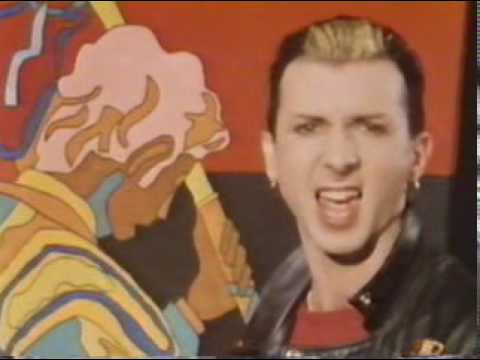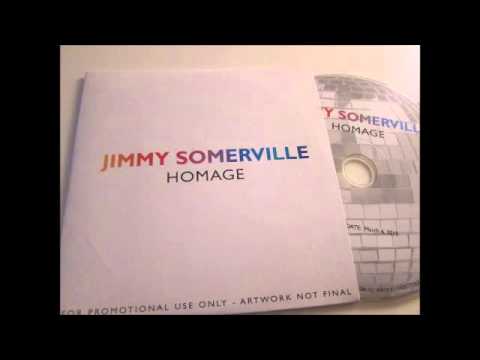Jimmy Somerville and I have something in common. When we were both 15 years old, we’d sit in our respective bedrooms and listen intensely to the seminal disco track ‘I Feel Love’. There was one major difference; while I began my particular journey of discovery into Donna Summer’s legendary song by first falling for Bronski Beat’s 1985 cover version, Somerville had – a decade earlier – obsessed over the original.
Even after speaking to him for just a few minutes, it’s clear that the spirit of disco is woven into Jimmy Somerville’s DNA like a giant glitter ball-sized extra chromosome. From hearing the likes of Gloria Gaynor and The Detroit Emeralds as a child, through his first teenage forays into the Glasgow disco scene and onto a musical career with Bronski Beat and The Communards punctuated by high-octane cover versions of classic tracks, disco music has been a constant source of inspiration and salvation.
So, it was perhaps inevitable that Somerville would at some stage release his own disco album. Comprising 12 of his own compositions, Homage is a joyous celebration of an often misunderstood category of music. "While it is easy to dismiss disco as a throwaway genre, it is actually about a whole movement of emancipated people seeking liberation," Jimmy tells me, in an attempt to convey the seismic impact disco had on him as a young gay man growing up in Glasgow in the 1970s.
As you may expect, Jimmy’s passion for disco elevates Homage. The album is a riot of four-on-the-floor beats, horns, electric pianos and Somerville’s trademark falsetto soaring across the luscious mix. It’s an album that Somerville confesses to having loved making and completes a perfect circle back to the music he treasured as a child.
Can you remember which the first disco tracks you ever heard were?
Jimmy Somerville: That’s tricky. I was born in 1961, so that early-to-mid 1970s crossover period from West Coast to disco was a huge thing for me. It’s difficult to pinpoint what I would have heard first – but it would have been via radio and by watching Top Of The Pops religiously that I would have become aware of stuff. There are a couple of records that I really remember; George McCrae with ‘Rock Your Baby’ and ‘Feel The Need’ by The Detroit Emeralds.
My mum used to play music in the kitchen when she was cooking Sunday lunch. One of the earliest tracks that I remember her playing was Frederick Knight’s ‘I Have Been Lonely For So Long’ and that is another song that sticks in my head from being a kid when I was about 12 or 13 years old. I remember then joining a record club where you could buy records through the post. There were three albums I bought; El Coco’s Cocomotion, Gloria Gaynor’s ‘Never Can Say Goodbye and a bizarre African record of spiritual songs.
What was it about disco music that resonated with you so much?
JS: I think when I look back at all of those songs there would be a celebration and something positive in the sound. Also, when I was beginning to go to gay clubs in Glasgow, one of the earliest disco albums I remember was by the Village People – way before ‘Y.M.C.A’ – an album which was like a four-track EP [1977’s Village People]. Years later I realised that the album was a map of gay America. There was a song about San Francisco, the Village People were from Greenwich Village and another song was named after Fire Island, which was a resort where people went to party at weekends.

That must have felt very exotic for someone living in Glasgow in the 1970s?
JS: It was. Basically, I am five foot four inches tall with red hair and, as a teenager, would look like a little girl. I was completely aware that there was something different about my sexuality. I was living with fear and shame and guilt and a real anxiety, yet I would look in the mirror and pretend to sing like a black man. It was my escape and my freedom.
It’s interesting that you got into disco music by listening to it in your bedroom, as opposed to hearing it, in situ, at a nightclub.
JS: Yes, I would listen to the music in my bedroom and then as I got older I would go to clubs. The first club I ever went to was in the city centre of Glasgow and it was called Shuffles. It had two floors – the main floor was a huge room – and then a basement where they played disco. I first went on my own and I was completely shitting myself. I think I was so scared, I threw up on the bus on the way. I got to the club and the first thing I ever danced to in a grown-up club was fifteen minutes of Love Trilogy by Donna Summer. By the time it had finished, I remember thinking "This is it – this is what it is all about and this is what I am all about."
That sounds like an incredible first dance.
JS: Those nights played a huge part of my teenage years. What I realise when I look back at myself now and my whole clubbing career, is that I found a freedom on the dancefloor and I also found a place to be on my own. I was in my own little world and I didn’t need to deal with anyone else. That feeling solidified where I wanted to be. Everything I have ever done has been to get to a club in order to dance. Looking back at the history of the politics of disco, it was about gay men, black men and also women having an uplifting celebration in the face of adversity and discrimination. While it is easy to dismiss disco as a throwaway genre – stuff like the Bee Gees and Saturday Night Fever – it is actually about a whole movement of emancipated people seeking liberation.
How much of a disco scene was there in Glasgow during your teenage years?
JS: There was a kind of underground scene. I remember there was a club called Shadows and the reason I got to go in there was all very dubious. Basically, before I went to clubs or bars, I discovered toilets around the city centre. I would hang around with other underage boys and we would meet older men. There was one man who would introduce me to some incredible music – and I don’t have any problem in sharing this with you – and he would basically give me money for sex, and I would go and buy records with the money. He would even tell me which records to buy. I remember one of the first records I bought was Harry Thumann’s ‘Underwater’. [Fucking TUNE! Ed] This man had played it to me and I remember thinking it was the most incredible thing – it is an instrumental masterpiece. My whole teenage years were based around sex, clubs and general underage shenanigans – and I lived for disco music.
As you began to make music yourself, how much did your love of disco influence how you wanted Bronski Beat to sound?
JS: At the time Bronski Beat were starting out, I was involved in a whole underground movement of gay politics, radicalism and direct action. I was hanging out in clubs that were playing electro, new wave and more alternative music. That’s when I would dance to things like Talking Heads and Simple Minds and stuff like that. One of the great things about Bronski Beat and The Communards was that my influences were coming from all over the place. In fact, my really early influences were coming from jazz and blues, like Peggy Lee and Connie Francis and a few country stars. So, I was being influenced by all of this stuff, but because I wanted to be in with the ‘in crowd’ I kept my disco records a bit of a secret. I would make myself tapes and mix up disco tracks with Talking Heads and Soft Cell.
You have covered a number of classic disco tracks in the past. Why did you specifically choose songs like ‘Don’t Leave Me This Way’ and ‘I Feel Love?
JS: They are all iconic gay songs and part of gay history. What I wanted to do was to take them away from the women who sang them. It was time to take these songs and have them sung by a gay man for gay men. When I was a kid, those songs were being danced to as a celebration for people who were finding some kind of voice. I wanted to take the radical step of singing them myself as a gay man to truly claim them.
I actually heard Bronski Beat’s version of ‘I Feel Love’ before the original version. The Donna Summer track was obviously a genre-defining moment. How did you approach covering such a bona fide classic?
JS: I can remember the reason why we did that version. We wanted to take a song that was gay and iconic and make it even gayer. The idea was to do a much more off-the-wall version – the electronics were very intense – and then add ‘Johnny Remember Me’ to the track. I love the chorus and melody of ‘Johnny Remember Me’ and by adding it, I was turning ‘I Feel Love’ into a gay love song. When we got Marc [Almond] to do the song, we basically had two gay men singing this song in which suddenly a man called Johnny appears, and we are both wanting him to remember us. It was so radical; when I look back we really did push the boat out with that.
One of the things I love about many classic disco songs is that sense of ‘joyous heartbreak’ – the music is very celebratory but the lyrics can be very angst-laden. Would you agree that your new album seems to evoke that spirit?
JS: Absolutely. I don’t know what you have picked up from the new songs but these lyrics are a celebration of my freedom from the kind of heartache that has been most of my life because of my own personal troubles and my issues with addiction. It was only recently that I came to terms with the fact that chemical substances do not sit well with me because once I start I cannot stop. Also, I was an incredibly troubled man, but since I have been into recovery I have started to understand who I am and what love truly is. It’s not just about one person having an intimate relationship with another and this is what I have tried to express on this new album. I did it with ‘Smalltown Boy’ and have tried to do it many times throughout my career, but this time I have done it from track one through to track 12, with a few bits of fun thrown in, like the song ‘Freak’ which harks back to the story of disco. But, the majority of the record is my understanding of love and heartache.
Did you set out with the idea of making Homage an album of disco songs?
JS: No, I had decided that I was going to do another electronic album in a small studio. But, this was happening since I had been in recovery. I don’t know why, but I just suddenly felt the need to make a full-on disco album, that would be celebratory and indulgent. [Producer] John [Winfield] was squealing at me, he was so excited, as the disco genre is a huge common factor of our musical history. We fired each other up.
Is there a sense that making Homage has been, and I hate to use the word, therapeutic for you?
JS: Totally. This album has really helped me move forward. The work I have done as part of my recovery programme has allowed me to open my mind and have some faith, belief and trust. It allowed me to have clarity and get into the music and the process of making music. I didn’t question it. Homage is a very special album – it’s more than a record, it is a real piece of liberation.
So, was it an easy record to make? Is it difficult to ‘disco-fy’ songs that were intended to be a different style of music?
JS: It was easy because the style had always been waiting in my head. I had no fear and I completely embraced it. I can listen to the album from track one to track 12, whereas in the past I would always hear things I knew I could have done better. This time I completely believed in the process and it happened naturally. I was nice seeing John watching me be excited, and really begin to believe in myself as a writer and an arranger. I have already written all the songs for the next project, which goes back a little but further to where disco came from; a more West coast laid back and stripped down sound.
It’s as if you have come full circle to the teenage boy who would listen to disco albums in his bedroom.
JS: I have done a double gatefold vinyl for this new album. When I saw the finished product I knew it was the album that I would have gone out and bought as a kid. I would have bought it and then gone and sat in a café with my friend Glynn. We would have had our sausage sandwich and a cup of tea, while we looked at the album and read all the liner notes. Then I would have gone home, sat on my bed and listened to it. I have finally made the album I would have bought as a teenager.
The album Homage is out now via Cherry Red Records





